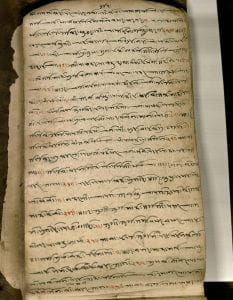by Iqbal Akhtar (Florida International University)
The idea of African as a conciousness emerges through colonization in much the same way the idea of an Indian nation emerged directed by and as a response to British colonization of the Subcontinent. Conversely, the Indian Ocean littoral has been characterized by more than two millennia of evinced interchange between the peoples of the Asian and African continents. The East African littoral created unique cosmopolitan communities where multilingual trade and a variety of faiths sacralized the eastern islands and coasts. The Khoja are one such littoral community whose story has remained unwritten as postcolonial nationalist narratives actively forgot their contribution in building the economic and social institutions that serve as the foundation of these postcolonial nation-states.
The Khoja are an Indic merchant community that left in waves from the subcontinent starting in the early 19th century. Their language and faith were caste-specific adapted to their mercantile professions and followed an amalgamation of local faiths from the Western coast of the Subcontinent (modern Sindh and Gujarat). Utilizing interdisciplinary methodologies, my research charts the evolution of Khoja identity over two centuries through language and script from Kacchi and Khojki through to Gujarati, Urdu, Swahili, and finally English. Their original caste faith is subsequently overwritten in the 20th century by colonial ideas of Islam and eventually merges with narratives of Global Islam.
The story of the Khoja is one of economic resilience in the face of war, revolution, and expulsion in the postcolonial upheaval of East Africa. The community transcends the nation-state creating homelands with each jamaat in a garland that honors host nations by connecting their communities and shifting expertise and resources across the globe. Yet, globalization in the 21st century has also led to a profound cultural loss of its vernacular knowledge and languages as its identity is increasingly shaped by new forms of the faith that wish to homogenize the ummah across the globe and authorize embedded Near Eastern culture as normative Islam. Pulled by Anglophone and Francophone modern identities in the West while being anchored to religious authority in the East, the question for Khoja identity in the 21st century is best summed up by the subtitle of the book by the late community historian Hassan Jaffer, Wither Khoja?
Check out Iqbal Akhtar’s book The Khōjā of Tanzania – Discontinuities of a Postcolonial Religious Identity (Brill 2021) and join the Institute for Islamic Though in Africa (ISITA) for his talk “The Khōjā of Tanzania: Discontinuities of a Postcolonial Religious Identity” on April 7 at 1pm. Click here to register.


Very interesting article projecting this Khoja community and their progress throughout their journey from subcontinent to this day. I have lived among this community, and brings memories. Congratulations to Iqbal Akhtar for such a great in-depth study.
Thanks for this article. Specifically, the multilinguality of the Khojas is really interesting